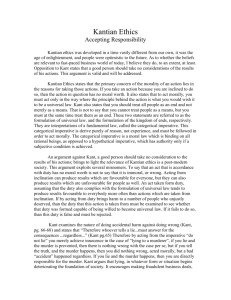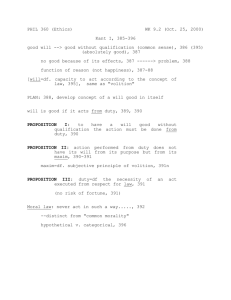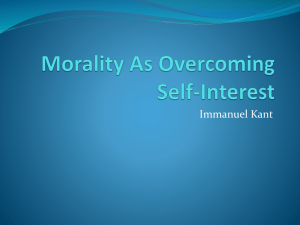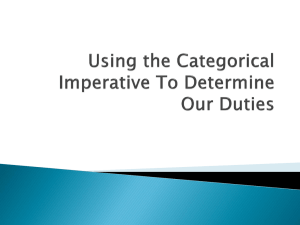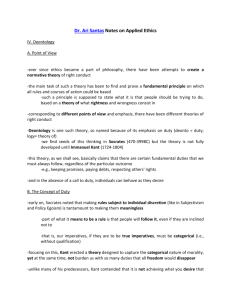Objections to Kant's deontological ethics
advertisement
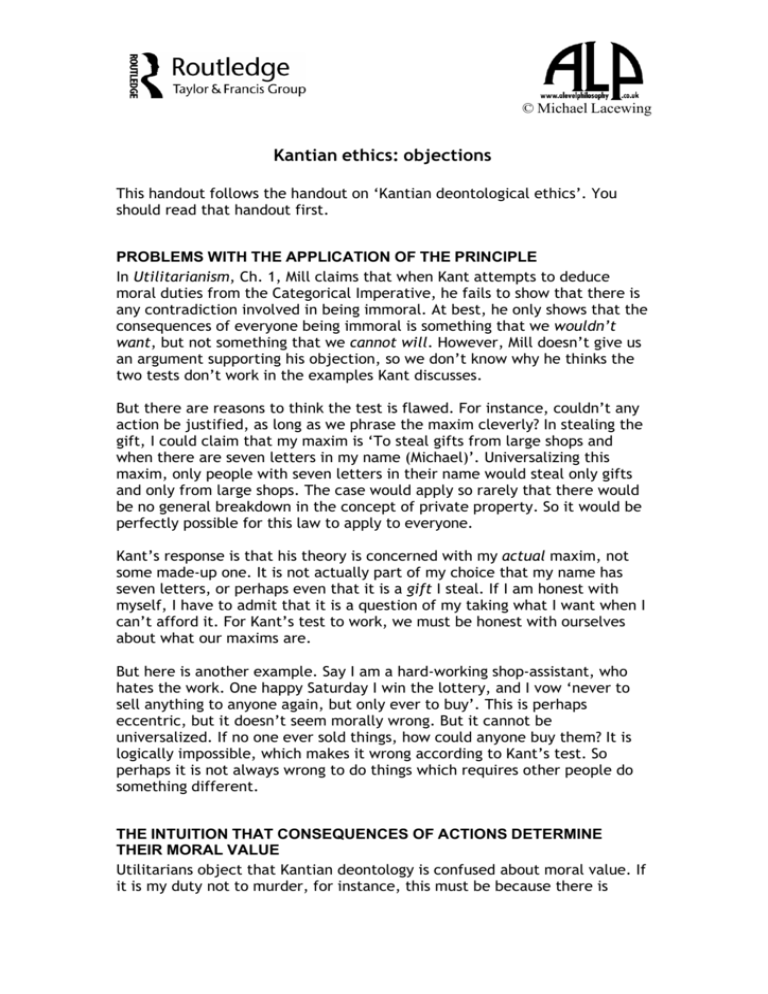
© Michael Lacewing Kantian ethics: objections This handout follows the handout on ‘Kantian deontological ethics’. You should read that handout first. PROBLEMS WITH THE APPLICATION OF THE PRINCIPLE In Utilitarianism, Ch. 1, Mill claims that when Kant attempts to deduce moral duties from the Categorical Imperative, he fails to show that there is any contradiction involved in being immoral. At best, he only shows that the consequences of everyone being immoral is something that we wouldn’t want, but not something that we cannot will. However, Mill doesn’t give us an argument supporting his objection, so we don’t know why he thinks the two tests don’t work in the examples Kant discusses. But there are reasons to think the test is flawed. For instance, couldn’t any action be justified, as long as we phrase the maxim cleverly? In stealing the gift, I could claim that my maxim is ‘To steal gifts from large shops and when there are seven letters in my name (Michael)’. Universalizing this maxim, only people with seven letters in their name would steal only gifts and only from large shops. The case would apply so rarely that there would be no general breakdown in the concept of private property. So it would be perfectly possible for this law to apply to everyone. Kant’s response is that his theory is concerned with my actual maxim, not some made-up one. It is not actually part of my choice that my name has seven letters, or perhaps even that it is a gift I steal. If I am honest with myself, I have to admit that it is a question of my taking what I want when I can’t afford it. For Kant’s test to work, we must be honest with ourselves about what our maxims are. But here is another example. Say I am a hard-working shop-assistant, who hates the work. One happy Saturday I win the lottery, and I vow ‘never to sell anything to anyone again, but only ever to buy’. This is perhaps eccentric, but it doesn’t seem morally wrong. But it cannot be universalized. If no one ever sold things, how could anyone buy them? It is logically impossible, which makes it wrong according to Kant’s test. So perhaps it is not always wrong to do things which requires other people do something different. THE INTUITION THAT CONSEQUENCES OF ACTIONS DETERMINE THEIR MORAL VALUE Utilitarians object that Kantian deontology is confused about moral value. If it is my duty not to murder, for instance, this must be because there is something bad about murder. But then if murder is bad, surely we should try to ensure that there are as few murders as possible. If I know that unless I kill someone deliberately, many people will die, how can I justify not killing that person on the grounds that I cannot universalize the motive of murder? Surely it is only my duty not to kill because death is bad. So I should prevent more deaths. What makes a will good is that is wills good ends. Kant’s response, of course, is that there are no ends that are good without qualification. So this cannot be the right analysis of the good will. But the disagreement goes deeper. Utilitarianism understands all practical reasoning – reasoning about what to do – as means-end reasoning: it is rational to do whatever brings about a good end. The utilitarian thinks it is just obvious that if something is good, more of it is better, and we ought to do what is better. Kant disagrees and offers an alternative theory of practical reasoning. Means-end reasoning is appropriate for hypothetical imperatives, but this is not all there is to practical reason. It is also irrational to act in a way that not everyone could act in. If rationality were only about means-end reasoning, then we can’t say that any ends – such as other people – are obligatory. Morality becomes hypothetical. You only ought to do your duty if you want to be morally good. This treats morality like just another desire or purpose which we may or may not have. Mill’s response to this, of course, is that happiness is the only desirable end. But, once again, Kant has argued that happiness is not always good. THE VALUE OF CERTAIN MOTIVES AND COMMITMENTS Utilitarianism faces the objection that it makes morality too demanding by requiring us to be impartial between our friends/family and people we don’t know. Kantian deontology doesn’t require this. While we are required to help others, we are not required to be completely impartial or maximise happiness. (There is no contradiction in a maxim which aims to help others but not maximise happiness.) However, how should we understand the moral worth of motives involved in particular relationships of love and friendship under Kant’s theory? Kant makes the motive of duty (doing your duty because it is your duty) the only motive that has moral worth, and says that doing something good for someone else because you want to is morally right, but not morally good. Suppose a woman visits a friend in hospital. The friend thanks her. She replies, ‘It was nothing, I was just doing my duty, motive is simply to do what is morally right’. The friend can legitimately feel upset. Kant seems to say that we have to want to benefit people because it is our duty to so, not because we like them. But surely, if I do something nice for you because I like you, that is a morally good action. Much of the time we do good things because we feel warmly towards the people we benefit. We can object that putting duty above feelings in our motives is somehow inhuman. Kant can respond that he is not trying to stop us from being motivated by our feelings. His point is that, when we are choosing what to do, how we feel should not be as important as what it is morally right to do. Our feelings shouldn’t decide the matter, our motive to do what is morally right should. But when you do something for a friend, should you think ‘I’ll do this because he is my friend; and it is morally right to do so’? Suppose a man is in a boating accident with both his wife and a stranger. Neither can swim, and he can only rescue one. We might think that he should simply rescue his wife. But if he thinks, ‘She’s my wife and it is morally permissible that I rescue her’, this seems to miss the particular importance that being married has, including its moral importance. The man as ‘one thought too many’, and we (and his wife!) can object to his way of thinking about what to do. His commitment to his wife means that he should stop at ‘She’s my wife’. Perhaps Kant can reply that you don’t actually need to have such a thought. His theory, after all, is how we can tell whether something is right or wrong, not how we should actually think all the time. So we can say that to be morally good, you only need to be willing to refuse to help your friend if that involved doing something morally wrong. And likewise for the man and his wife. CONFLICTS BETWEEN DUTIES Kant argues that our moral duties are absolute. A duty is absolute if it permits no exceptions. Nothing can override a moral duty, because it is categorical. All other ends have their worth in relation to the good will. But the good will is motivated by duty. This causes problems in cases in which it seems that two absolute duties conflict with each other. Should I break a promise or tell a lie? Should I betray a friend to save a life? If I am faced with a situation in which I must do one or the other, then Kant’s theory implies that whatever I do must be wrong. One response is to say that a real conflict of duties can never occur. If there appears to be a conflict, we have misunderstood what at least one duty requires of us. If duties are absolute, we must formulate our duties very, very carefully to avoid them conflicting. Kant himself that some of our duties are very straightforward, e.g. our duty not to lie is simply that – never lie. But you can believe the rest of Kant’s theory and not accept his view that duties are simple like this. For example, you could argue that ‘don’t lie’ isn’t a duty. Our duty could be something like ‘don’t lie unless you have to lie to save a life’. There will always be some maxim which you can act on which you will be able to universalize. So it will always be possible to do your duty. We can object that it is more realistic simply to say that (most) duties are not absolute. For instance, there is a duty not to lie, but it may be permissible to lie in order to save someone’s life. Less important duties can ‘give way’ to more important ones. In cases of conflict, one will give way and no longer be a duty in that situation. In The Elements of Moral Philosophy (Ch. 9, §3), Rachels argues that Kant was right that we must be consistent in moral judgements. Our moral judgements must be based on reasons, and if some consideration is a reason in one situation, it is a reason for other people and in other similar situations. We can’t think of ourselves as special, and allow ourselves to do what we would not want others to do. But Kant was wrong to think that consistency requires absolute rules, no exceptions. Instead, when we break a rule, we need a good reason to do so, a reason that we are willing to accept other people acting on as well. However, this solution must reject the basis of Kant’s theory of morality. His whole analysis of duty is that it is categorical. It is difficult to see how his understanding of why morality is rationally required could allow that duties can give way to each other.

